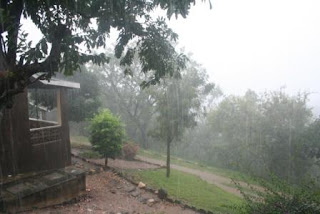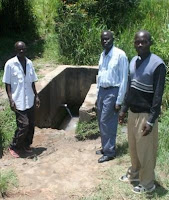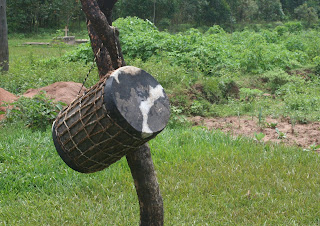 Thunderstorms here usually seem to happen in the middle of the night heralding a period of sleeplessness maintained by crashing thunder and torrential rain. Today it waited until 6.30 when we awoke to the sound of distant thunder, and the skies which had promised dawn, darkening again as heavy spots of rain began to fall. Soon the heavens were open, with forks of lightning striking terrifyingly close to our house. The claps of thunder were awesome.
Thunderstorms here usually seem to happen in the middle of the night heralding a period of sleeplessness maintained by crashing thunder and torrential rain. Today it waited until 6.30 when we awoke to the sound of distant thunder, and the skies which had promised dawn, darkening again as heavy spots of rain began to fall. Soon the heavens were open, with forks of lightning striking terrifyingly close to our house. The claps of thunder were awesome.
Sheltering in the porch we found our local mat and basket maker. He was delighted to be offered a cup of tea, a banana and refuge from the storm. We hope he also enjoyed Richard Strauss’s Alpine Symphony which we were playing in celebration of the thunder storm.
Anne and I arrived in Uganda last year in this same season of dramatic thunder storms and heavy rain. But the irony today is that, whilst we are experiencing frequent deluges, the UN is warning of drought in the Horn of Africa, including Karamoja in NE Uganda.
Here in Africa, water is king. Of course, that is true everywhere, but here it is much more
 obvious. Too much water, as in West Nile at the moment, and crops are ruined; too little, as in Karamoja, and the land remains arid and unproductive - both result in hunger and/or increased food costs.
obvious. Too much water, as in West Nile at the moment, and crops are ruined; too little, as in Karamoja, and the land remains arid and unproductive - both result in hunger and/or increased food costs.Then there is the question of water quality. Water spells the difference between sickness and health, life and death. Here in NW Uganda many people still have to walk to the local river or spring to collect water where quality is far from certain. A spring or borehole protected by a concrete enclosure is best, but even this can be a source of disease. The college at Ringili has its own protected borehole, but there have been suspicions that this water-source may be responsible for cases of typhoid.

In Kuluva we are just over the hill from Ringili. Here we are blessed with a ready supply of water pumped from the hospital borehole to a tank in our house. Sometimes, though, even this runs out. Then we have to rely on 25 litre jerry cans. Lucy is a great asset as she transports these heavy yellow cans on her head from an alternative borehole on the site.

Having to decant water from jerry cans for every use is very tiring and annoying. It makes you think twice about having a shower (or a ‘pour’ as it actually is), or even flushing the loo. Water shortages can go on for days, and it is a great cause for celebration when we hear water beginning to pour into the tank in our roof once again. The only downside to this is that it tends to start in the middle of the night and wakes us up. It’s a bit like a thunder storm and torrential rain really.
We’ll see what the next 24 hours has in store for us.





